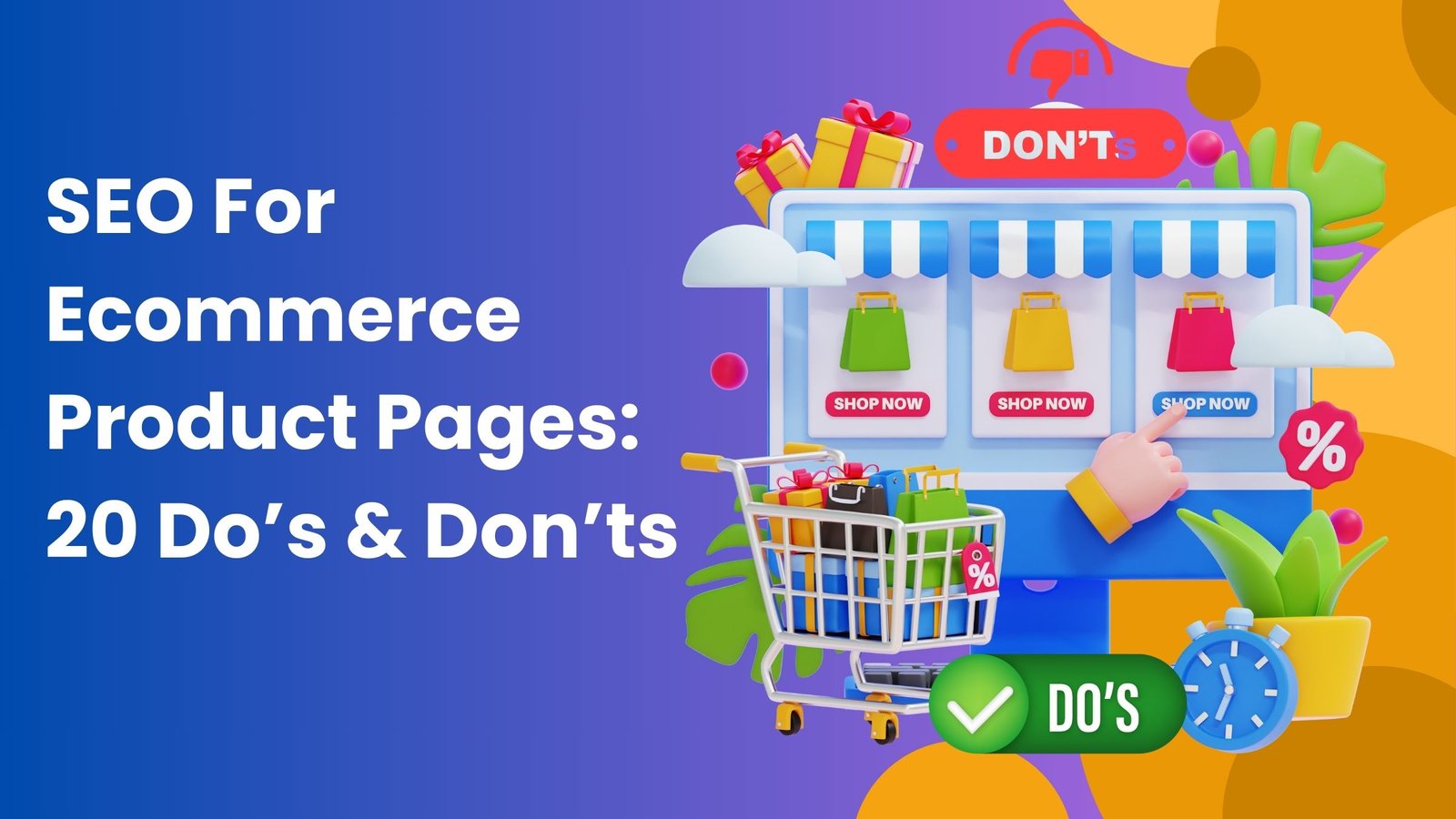Want to see your product pages rank higher with shoppers in New York and Dubai? Effective ecommerce SEO optimization is key to driving organic traffic and increasing conversions for your online business. At Cotask IT Solution, an experienced ecommerce agency, we specialize in optimizing ecommerce site design and ensuring your ecommerce web page design attracts the right customers. This in-depth guide reveals 20 crucial do\’s and don\’ts to supercharge your ecommerce product page SEO efforts.
10 Do’s Of Ecommerce Product Page SEO
1. Fine-Tune Your Keyword Strategy
C0onduct thorough keyword research to understand what potential buyers in New York and Dubai are typing into search engines when looking for products like yours. Focus on a mix of broad and specific keywords relevant to each product page. A strong keyword strategy is the foundation of effective ecommerce SEO optimization.
2. Optimize Titles And Meta Descriptions
Craft compelling and keyword-rich title tags and meta descriptions for every product page. These snippets are your digital storefront window in search results. Incorporate your primary keywords and a persuasive call to action to encourage clicks from users in New York and Dubai. Effective ecommerce SEO optimization starts with well-optimized titles.
3. Mark Up Product Pages With Structured Data
Implement schema markup (structured data) to provide search engines with detailed information about your products, such as price, availability, and reviews. This can lead 1 to eye-catching rich snippets in search results, improving visibility and click-through rates for shoppers in New York and Dubai.( slashdev.io)
4. Add Clear And Helpful FAQs
Include a frequently asked questions (FAQs) section on your product pages. This not only addresses potential customer queries but also provides natural opportunities to incorporate relevant keywords. This enhances your ecommerce SEO optimization by targeting specific questions.
5. Always Write Unique Product And Meta Descriptions
Avoid using generic descriptions provided by manufacturers. Create original, engaging, and detailed descriptions that highlight the unique benefits and features of each product. This is vital for avoiding duplicate content issues and attracting customers in New York and Dubai. Unique product descriptions are a cornerstone of good ecommerce SEO optimization.
6. Share Real Testimonials And Customer Reviews
Genuine customer reviews build trust and social proof, influencing purchasing decisions. Encourage customers to leave reviews, as this user-generated content can also naturally incorporate relevant keywords. This social proof supports your ecommerce SEO optimization efforts.
7. Test Landing Pages To Find The Best
A/B test different elements of your product pages, such as headlines, calls to action, and layouts, to identify what resonates best with your target audience and improves conversion rates. Optimizing your ecommerce web page design through testing is crucial.
8. Use High-Quality Video And Imagery
Visually appealing product images and videos are essential for engaging shoppers. Optimize these visuals with descriptive file names and alt text containing relevant keywords. High-quality visuals enhance your ecommerce site design and user experience.
9. Minimize Page Load Times
Slow-loading pages can frustrate users and negatively impact your search engine rankings. Optimize image sizes, leverage browser caching, and consider a content delivery network (CDN) to improve page speed. Fast loading times are vital for effective ecommerce SEO optimization.
10. Audit Your Product Pages For Technical Issues
Regularly check your product pages for technical errors such as broken links, crawl errors, and indexing issues. Addressing these problems ensures search engines can effectively crawl and index your content. A clean ecommerce site design is technically sound.
10 Don’ts Of Ecommerce Product Page SEO
1. Don’t Use Product Descriptions From The Manufacturer’s Website
As mentioned earlier, using duplicate content can harm your SEO efforts. Always create original descriptions that highlight your unique selling points.
2. Don’t Kill Your Seasonal Pages Once Peak Is Past
Instead of deleting seasonal product pages, consider updating them with relevant content for the off-season or redirecting them to related evergreen product categories.
3. Don’t Use Automated Optimization
While tools can assist, relying solely on automated SEO optimization can lead to generic and ineffective results. A human touch and strategic thinking are essential for effective ecommerce SEO optimization.
4. Don’t Pull Out-of-Stock Pages
Instead of removing out-of-stock pages, clearly indicate the item is unavailable and provide options such as back-in-stock notifications or links to similar products.
5. Don’t Use The Wrong Type Of Structured Data – Or None At All
Implementing incorrect or missing schema markup can hinder your SEO performance. Ensure you are using the appropriate schema types for your product pages.
6. Don’t Use Weak Calls To Action – Or Omit Them Entirely
Clear and compelling calls to action (CTAs) guide users towards making a purchase. Use action-oriented language and make your CTAs prominent within your ecommerce web page design.
7. Don’t Optimize For CEO Keywords And Keywords With No Volume
Focus on keywords that your target audience actually uses. Optimizing for irrelevant or low-volume keywords will not drive meaningful traffic. Your keyword strategy should focus on relevant terms.
8. Don’t Miss Opportunities For Internal Linking And Backlinks
Strategically link between your product pages and other relevant content on your site. Additionally, aim to earn high-quality backlinks from reputable websites to boost your site\’s authority. Internal linking improves your ecommerce site design navigation.
9. Don’t Forget Mobile Optimization
With a significant portion of online shopping happening on mobile devices, ensuring your product pages are fully responsive and mobile-friendly is crucial for reaching customers in New York and Dubai. A responsive ecommerce web page design is essential.
10. Don’t Forget Accessibility
Ensure your website and product pages are accessible to users with disabilities. This includes providing alt text for images and using clear and understandable language.
Conclusion
Mastering ecommerce SEO for product pages is an ongoing process that requires attention to detail and a strategic approach. By implementing these 20 do\’s and don\’ts, you can significantly improve your online store\’s visibility in New York and Dubai, ultimately driving more traffic and increasing your sales. Partner with an experienced ecommerce agency like Cotask IT Solution to take your ecommerce site design and ecommerce web page design to the next level.
FAQs
Q: How often should I update my product page SEO? A: Regularly. Keyword trends change, and your product offerings may evolve. It\’s essential to continuously monitor and update your product page SEO to maintain optimal performance.
Q: What are the most important keywords for my ecommerce product pages? A: The most important keywords are those that your target customers in New York and Dubai are actively searching for when looking to buy your specific products. Thorough keyword research is essential to identify these terms for effective ecommerce SEO optimization.
Q: How long should my product descriptions be? A: There\’s no fixed length, but aim for detailed and engaging descriptions that provide all the necessary information while incorporating relevant keywords naturally. Focus on clarity and conciseness for optimal ecommerce SEO optimization.
Q: Why are customer reviews important for ecommerce SEO? A: Customer reviews provide fresh, unique content that can include long-tail keywords. They also build trust and social proof, which can improve click-through rates and conversions, supporting your overall ecommerce SEO optimization.
Q: What is structured data and why is it important for ecommerce? A: Structured data is code that helps search engines understand the content on your pages. For ecommerce, it allows for rich snippets in search results, such as product prices, availability, and ratings, which can increase visibility and attract more qualified traffic in New York and Dubai.






